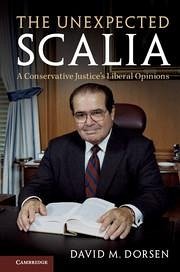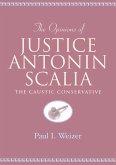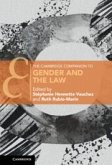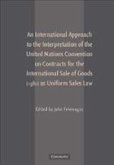Schade – dieser Artikel ist leider ausverkauft. Sobald wir wissen, ob und wann der Artikel wieder verfügbar ist, informieren wir Sie an dieser Stelle.
- Gebundenes Buch
- Merkliste
- Auf die Merkliste
- Bewerten Bewerten
- Teilen
- Produkt teilen
- Produkterinnerung
- Produkterinnerung
This book explains the flawed judicial philosophy of one of the most important Supreme Court Justices of the past century.
Andere Kunden interessierten sich auch für
![The Opinions of Justice Antonin Scalia The Opinions of Justice Antonin Scalia]() Paul I. WeizerThe Opinions of Justice Antonin Scalia32,65 €
Paul I. WeizerThe Opinions of Justice Antonin Scalia32,65 €![The Legal Mind The Legal Mind]() Broz &The Legal Mind125,99 €
Broz &The Legal Mind125,99 €![The Cambridge Companion to Gender and the Law The Cambridge Companion to Gender and the Law]() The Cambridge Companion to Gender and the Law114,99 €
The Cambridge Companion to Gender and the Law114,99 €![Chinese Legal Reform and the Global Legal Order Chinese Legal Reform and the Global Legal Order]() Chinese Legal Reform and the Global Legal Order128,99 €
Chinese Legal Reform and the Global Legal Order128,99 €![An International Approach to the Interpretation of the United Nations Convention on Contracts for the International Sale of Goods (1980) as Uniform Sales Law An International Approach to the Interpretation of the United Nations Convention on Contracts for the International Sale of Goods (1980) as Uniform Sales Law]() John Felemegas (ed.)An International Approach to the Interpretation of the United Nations Convention on Contracts for the International Sale of Goods (1980) as Uniform Sales Law94,99 €
John Felemegas (ed.)An International Approach to the Interpretation of the United Nations Convention on Contracts for the International Sale of Goods (1980) as Uniform Sales Law94,99 €![The Making of Modern Property The Making of Modern Property]() Anna Di RobilantThe Making of Modern Property130,99 €
Anna Di RobilantThe Making of Modern Property130,99 €![The Construction of Fatherhood The Construction of Fatherhood]() Alice MargariaThe Construction of Fatherhood125,99 €
Alice MargariaThe Construction of Fatherhood125,99 €-
-
This book explains the flawed judicial philosophy of one of the most important Supreme Court Justices of the past century.
Produktdetails
- Produktdetails
- Verlag: Cambridge University Press
- Seitenzahl: 394
- Erscheinungstermin: 6. Februar 2017
- Englisch
- Abmessung: 236mm x 159mm x 30mm
- Gewicht: 692g
- ISBN-13: 9781107184107
- ISBN-10: 110718410X
- Artikelnr.: 47616486
- Herstellerkennzeichnung
- Libri GmbH
- Europaallee 1
- 36244 Bad Hersfeld
- gpsr@libri.de
- Verlag: Cambridge University Press
- Seitenzahl: 394
- Erscheinungstermin: 6. Februar 2017
- Englisch
- Abmessung: 236mm x 159mm x 30mm
- Gewicht: 692g
- ISBN-13: 9781107184107
- ISBN-10: 110718410X
- Artikelnr.: 47616486
- Herstellerkennzeichnung
- Libri GmbH
- Europaallee 1
- 36244 Bad Hersfeld
- gpsr@libri.de
David Dorsen is Of Counsel with Sedgwick, LLP. He served as an Assistant US Attorney in New York under Robert M. Morgenthau, and later as Assistant Chief Counsel of the Senate Watergate Committee under Senator Sam Ervin. He has taught at Duke University, North Carolina, Georgetown University Law Center, Washington DC, and George Washington University Law School, Washington DC. His book, Henry Friendly, Greatest Judge of his Era (with Richard A. Posner, 2012), won the Green Bag Award for Exemplary Legal Writing.
Introduction - what is liberal?
Part I. Scalia's Judicial Philosophy: 1. The Confirmation hearings
2. Scalia's principles of decision making
Part II. Scalia's Conservative Constitutional Opinions: 3. First and Second Amendments
4. Constitutional criminal procedure
5. Privacy and individual rights
6. Government power and regulation
Part III. Scalia's Liberal Constitutional Opinions: 7. First Amendment - freedom of speech and more
8. Fourth Amendment - search and seizure
9. Fifth Amendment - criminal applications
10. Sixth Amendment - right to trial by jury
11. Sixth Amendment - confrontation clause
12. Sixth Amendment - right to counsel
13. Seventh Amendment - right to jury trial
14. Habeas Corpus
15. Separation of powers and Federalism
16. Commerce clause and other provisions
Part IV. Scalia's Conflicted Constitutional Opinions: 17. Political speech
18. Antiabortion demonstrations
19. Free exercise of religion
20. Punitive damages
21. Peremptory challenges
Part V. Originalism Reconsidered: 22. Fundamentals reconsidered - textualism and originalism
23. Fundamentals reconsidered - other doctrines
24. Conservative opinions reconsidered - individual rights
25. Conservative opinions reconsidered - other
26. Liberal opinions reconsidered
27. Conflicted opinions reconsidered
Part VI. Scalia's Nonconstitutional Opinions: 28. Four Liberal special cases
29. Liberal criminal statutory opinions
30. Liberal civil statutory opinions
31. Conservative statutory opinions
Part VII. Finale: 32. The other originalist justice
33. Conclusion.
Part I. Scalia's Judicial Philosophy: 1. The Confirmation hearings
2. Scalia's principles of decision making
Part II. Scalia's Conservative Constitutional Opinions: 3. First and Second Amendments
4. Constitutional criminal procedure
5. Privacy and individual rights
6. Government power and regulation
Part III. Scalia's Liberal Constitutional Opinions: 7. First Amendment - freedom of speech and more
8. Fourth Amendment - search and seizure
9. Fifth Amendment - criminal applications
10. Sixth Amendment - right to trial by jury
11. Sixth Amendment - confrontation clause
12. Sixth Amendment - right to counsel
13. Seventh Amendment - right to jury trial
14. Habeas Corpus
15. Separation of powers and Federalism
16. Commerce clause and other provisions
Part IV. Scalia's Conflicted Constitutional Opinions: 17. Political speech
18. Antiabortion demonstrations
19. Free exercise of religion
20. Punitive damages
21. Peremptory challenges
Part V. Originalism Reconsidered: 22. Fundamentals reconsidered - textualism and originalism
23. Fundamentals reconsidered - other doctrines
24. Conservative opinions reconsidered - individual rights
25. Conservative opinions reconsidered - other
26. Liberal opinions reconsidered
27. Conflicted opinions reconsidered
Part VI. Scalia's Nonconstitutional Opinions: 28. Four Liberal special cases
29. Liberal criminal statutory opinions
30. Liberal civil statutory opinions
31. Conservative statutory opinions
Part VII. Finale: 32. The other originalist justice
33. Conclusion.
Introduction - what is liberal?
Part I. Scalia's Judicial Philosophy: 1. The Confirmation hearings
2. Scalia's principles of decision making
Part II. Scalia's Conservative Constitutional Opinions: 3. First and Second Amendments
4. Constitutional criminal procedure
5. Privacy and individual rights
6. Government power and regulation
Part III. Scalia's Liberal Constitutional Opinions: 7. First Amendment - freedom of speech and more
8. Fourth Amendment - search and seizure
9. Fifth Amendment - criminal applications
10. Sixth Amendment - right to trial by jury
11. Sixth Amendment - confrontation clause
12. Sixth Amendment - right to counsel
13. Seventh Amendment - right to jury trial
14. Habeas Corpus
15. Separation of powers and Federalism
16. Commerce clause and other provisions
Part IV. Scalia's Conflicted Constitutional Opinions: 17. Political speech
18. Antiabortion demonstrations
19. Free exercise of religion
20. Punitive damages
21. Peremptory challenges
Part V. Originalism Reconsidered: 22. Fundamentals reconsidered - textualism and originalism
23. Fundamentals reconsidered - other doctrines
24. Conservative opinions reconsidered - individual rights
25. Conservative opinions reconsidered - other
26. Liberal opinions reconsidered
27. Conflicted opinions reconsidered
Part VI. Scalia's Nonconstitutional Opinions: 28. Four Liberal special cases
29. Liberal criminal statutory opinions
30. Liberal civil statutory opinions
31. Conservative statutory opinions
Part VII. Finale: 32. The other originalist justice
33. Conclusion.
Part I. Scalia's Judicial Philosophy: 1. The Confirmation hearings
2. Scalia's principles of decision making
Part II. Scalia's Conservative Constitutional Opinions: 3. First and Second Amendments
4. Constitutional criminal procedure
5. Privacy and individual rights
6. Government power and regulation
Part III. Scalia's Liberal Constitutional Opinions: 7. First Amendment - freedom of speech and more
8. Fourth Amendment - search and seizure
9. Fifth Amendment - criminal applications
10. Sixth Amendment - right to trial by jury
11. Sixth Amendment - confrontation clause
12. Sixth Amendment - right to counsel
13. Seventh Amendment - right to jury trial
14. Habeas Corpus
15. Separation of powers and Federalism
16. Commerce clause and other provisions
Part IV. Scalia's Conflicted Constitutional Opinions: 17. Political speech
18. Antiabortion demonstrations
19. Free exercise of religion
20. Punitive damages
21. Peremptory challenges
Part V. Originalism Reconsidered: 22. Fundamentals reconsidered - textualism and originalism
23. Fundamentals reconsidered - other doctrines
24. Conservative opinions reconsidered - individual rights
25. Conservative opinions reconsidered - other
26. Liberal opinions reconsidered
27. Conflicted opinions reconsidered
Part VI. Scalia's Nonconstitutional Opinions: 28. Four Liberal special cases
29. Liberal criminal statutory opinions
30. Liberal civil statutory opinions
31. Conservative statutory opinions
Part VII. Finale: 32. The other originalist justice
33. Conclusion.








